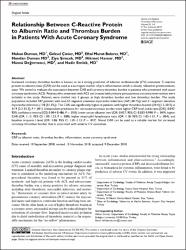Relationship between C-reactive protein to albumin ratio and thrombus burden in patients with acute coronary syndrome

Göster/
Erişim
info:eu-repo/semantics/openAccessTarih
2019Yazar
Duman, HakanÇinier, Göksel
Bakırcı, Eftal Murat
Duman, Handan
Şimşek, Ziya
Hamur, Hikmet
Emlek, Nadir
Üst veri
Tüm öğe kaydını gösterKünye
Duman, H., Çinier, G., Bakırcı, E. M., Duman, H., Şimşek, Z., Hamur, H., Değirmenci, H., & Emlek, N. (2019). Relationship Between C-Reactive Protein to Albumin Ratio and Thrombus Burden in Patients With Acute Coronary Syndrome. Clinical and applied thrombosis/hemostasis : official journal of the International Academy of Clinical and Applied Thrombosis/Hemostasis, 25, 1076029618824418. https://doi.org/10.1177/1076029618824418Özet
Increased coronary thrombus burden is known to be a strong predictor of adverse cardiovascular (CV) outcomes. C-reactive protein to albumin ratio (CAR) can be used as a surrogate marker of pro-inflammation which is closely related to prothrombotic state. We aimed to evaluate the association between CAR and coronary thrombus burden in patients who presented with acute coronary syndrome (ACS). Patients who presented with ACS and treated with primary percutaneous coronary intervention were included in the study. Patients were divided into 2 groups as high thrombus burden and low thrombus burden. the study population included 347 patients with non-ST-segment elevation myocardial infarction (169 [48.7%]) and ST-segment elevation myocardial infarction (178 [51.3%]). the CAR was significantly higher in patients with higher thrombus burden (24.4 [1.2-30.2] vs 31.9 [2.2-31.3], P < .001). Independent predictors for increased thrombus burden were higher CRP level (odds ratio [OR]: 0.047; 95% confidence interval [CI]: 0.004-0.486; P = .010), lower serum albumin level (OR: 0.057; 95% CI: 0.033-0.990; P = .049), higher CAR (OR: 1.13; 95% CI: 1.03-1.23; P = .008), higher neutrophil-lymphocyte ratio (OR: 1.18; 95% CI: 1.05-1.31; P = .004), and baseline troponin I level (OR: 1.06; 95% CI: 1.01-1.13; P = .017). Novel CAR can be used as a reliable marker for increased coronary thrombus burden that is associated with adverse CV outcomes.

















